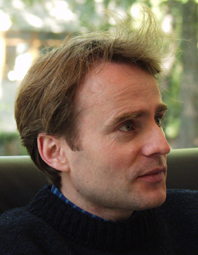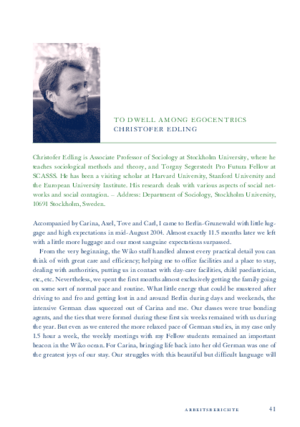
Christofer Edling, Ph.D.
Associate Professor of Sociology
University of Stockholm
Born in 1966 in Stockholm
Studied Sociology at Stockholm University
Fellowship
Segerstedt Pro Futura-Fellow
Project
The Matthew Effect: a Case Study in Social Mechanisms
I will work on processes of self-reinforcement - called Matthew effects after the Gospel of Matthew (25:29) - that lead to positive and negative feedback loops. Robert Merton first used the label in an analysis of the reward structure in science, but these processes describe many proverbial tales in which "the rich get richer and the poor get poorer". Like all good proverbs, these processes are in accordance with everyday intuition, but have also been established in learning and education, in the economy, and in the growth of complex networks, to mention only a few areas. In social life, observable imprints from these processes are hierarchical orderings and skew distributions, and as such they seem to be essential for understanding the dynamics of social stratification. This line of research involves several steps. First, initial theoretical analysis provides a sociological conceptualization of the Matthew effect. This is followed by a survey of cases that exemplify the Matthew effect, spanning traditional social science as well as literature. Insight from cases will inform an attempt to model the Matthew effect. Several examples of such models exist, notably in models of endogenous growth processes and evolutionary dynamics. In the final step, formal models are brought to bear on large-scale data in the analysis of topical issues of social exclusion, career trajectories, network dynamics, etc.Recommended Reading
Edling, Christofer. "Rational Choice Theory and Quantitative Analysis: A Comment on Goldthorpe's Sociological Alliance." European Sociological Review 16, 1 (2000): 1-8.
Liljeros, F., C. Edling, et al. "The Web of Human Sexual Contacts." Nature 411 (2001): 907-908.
Edling, C. and F. Liljeros. "Spatial Diffusion of Social Organizing." Advances in Strategic Management 20 (2003): 267-290.
Colloquium, 01.02.2005
The Matthew Effect and Dynamics of Social Structure
I wish to present to you the result from some of my readings in the last three months. This is a first step into what I hope will become a theoretical synthesis and eventually also an empirical investigation of stratification processes. What I will present is in every respect still highly tentative.
Paraphrasing the Gospel of St. Matthew 25:29, Robert Merton introduced the idea of a Matthew effect in science by which 1) rewards for scientific contributions tend to be distributed to those scientists that are already well established in the scientific community, and 2) receiving rewards in turn makes those scientists even more established. Thus, the basic idea of the Matthew effect is that of a positive (or negative) feedback loop which makes the rich get richer and the poor get poorer. Of course, Merton is not the only one who has been referring to this passage of the bible when observing the abundance of skew distributions clearly visible at various locations in society, although he certainly was successful in coining the notion of the Matthew effect. I will briefly present two contributions besides Merton's 1968 paper. These are taken from Primo Levi's horrifying account of surviving Auschwitz found in his autobiographical "If this is a man", and from Gunnar Myrdal's "American dilemma", a huge work on race relations in USA, carried out in the early 1940's.
Specifically, I want to connect the depiction of the Matthew effect given by these three authors to our understanding of the dynamics of social structures (networks). I relate the three cases to ideas of network growth, to the strategic management of social ties, and to social homophily and stereotyping. I basically try to conceptualize the connections between feedback loops and social structure that are already implicit in the texts in a network oriented fashion.
Publications from the Fellow Library
Edling, Christofer (Santa Barbara, Calif. [u.a.], 2011)
Sociological insights of great thinkers : sociology through literature, philosophy, and science
Edling, Christofer (2011)
August Strindberg: Forms of interaction
Edling, Christofer (Stockholm, 1998)
Essays on social dynamics Stockholm studies on social mechanisms ; 2
